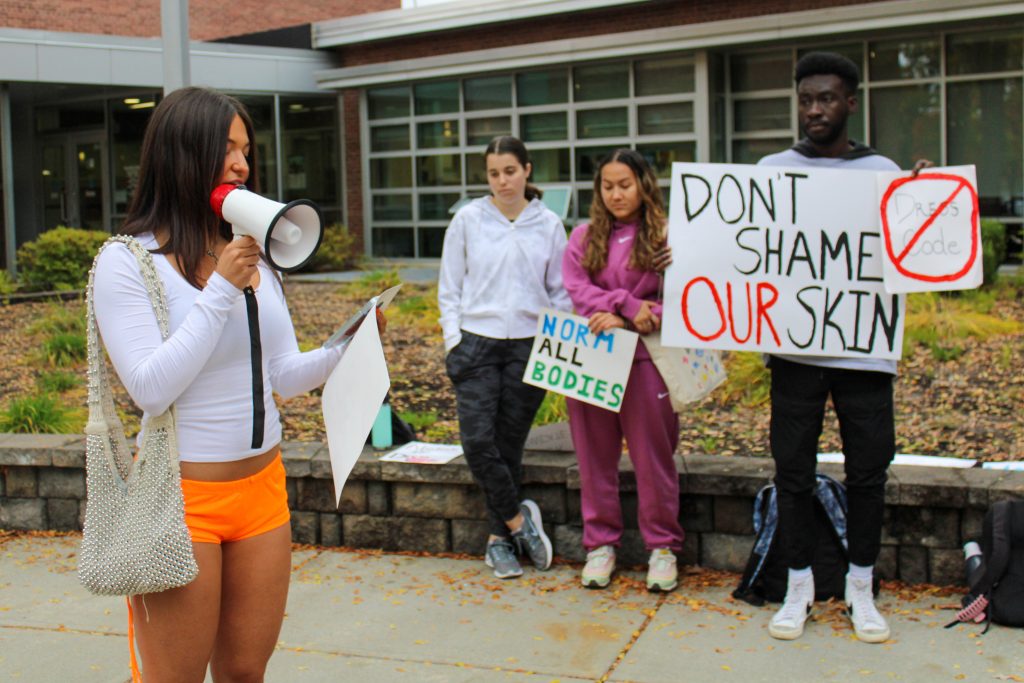Binghamton University students gathered at the East Gym to protest its dress code this past Friday.
The protest took place just outside the front doors of the East Gym, with students from a variety class years present. Students used posters and speeches to share their opinions on the dress code — which students claim recently begun to be enforced — while also collecting signatures for a petition. The Home Box Office (HBO), who were in the process of filming a different program, was also present to capture the event.
The event was organized by Olivia Eichenstein, ‘22, the founder of Girl Gains, a girls weight lifting club on campus. According to Eichenstein, of the over 400 Girl Gains members, almost all of them either know someone who has been “dress coded” at the East Gym or have been themselves. “Dress coding” is a term often used to refer to being warned of one’s clothing due to policies in place.
Eichenstein said the main goal of Girl Gains is to provide a safe space at the gym for girls who may not feel comfortable going otherwise.
“People should be able to freely express themselves and are capable of that,” Eichenstein said. “And without the distraction of the dress code people could perform really successfully in the gym. I don’t see any need for one. Confidently, I can say that I represent a lot of people’s opinions when I say that we don’t need a dress code.”
When a student is “dress coded” at the East Gym, they are given the choice of wearing either a pinny or a T-shirt. The T-shirts offered tend to be in mostly smaller sizes, according to Eichenstein.
Laura Cichostepski, assistant director of marketing at the East Gym, explained that the dress code policy is not new, and has been in place since at least 2013. Cichostepski wrote that the main reason behind the dress code’s implementation is to help reduce exposure to viruses and skin infections that can be spread through contact with various pieces of equipment.
“We are an active member of our national organization for collegiate recreation, [the National Intramural and Recreational Sports Association],” Cichostepski wrote in an email. “This past spring and summer, we consulted with a number of colleagues across the region regarding dress code policies in place at other universities. Our dress code policy is the same or very similar to facilities across the country, for the same purpose — maintaining patron health and safety.”
The East Gym also has other policies in place to prevent the spread of disease, in addition to its dress code. Patrons of the gym are provided with cleaning materials and are expected to wipe down and clean the equipment after use.
Alexis Barakakos, a senior majoring in psychology, explained that she attended the protest to promote the loosening of the restrictions.
“I’m hoping as a result of the signatures that we get on the petition that we can get Campus Recreation to allow people to wear clothing that exposes their torso and to more heavily enforce the already existing policy of wiping down equipment before and after use,” Barakakos said.
As the protest continued, the students spoke with a reporter from HBO, sharing their stories with dress code enforcement at the East Gym and their motivations for calling for its removal. Some students wore examples of the outfits they would wear to the gym if there were not a dress code. Students also spoke to those attending the gym, in order to educate them on the specifics of the dress code.
Jenna Leonardi, president of Girl Gains and a junior majoring in biomedical engineering, said she believes the dress code is unfair, as well as inconsistent. Leonardi described her goals for the protest’s outcome.
“I’m really hoping that it will make an impact and girls will see and feel like they can share their stories of getting dress-coded and anything that has happened in the gym and that they can speak out against it,” Leonardi said. “I just want people who have gone to the East Gym and have had these experiences to be able to come and talk and show what’s actually been going on.”
More students continued to join the protest as the day went on. As the event neared its end, students continued to speak to one another and request signatures from those walking by.
Eichenstein expressed her hope that the protest will make a positive impact on the Binghamton community.
“I would love for people to gain awareness,” Eichenstein said. “Even if one person doesn’t get dress-coded and it doesn’t affect them, it affects someone they know, their friends [and] their family members.”



